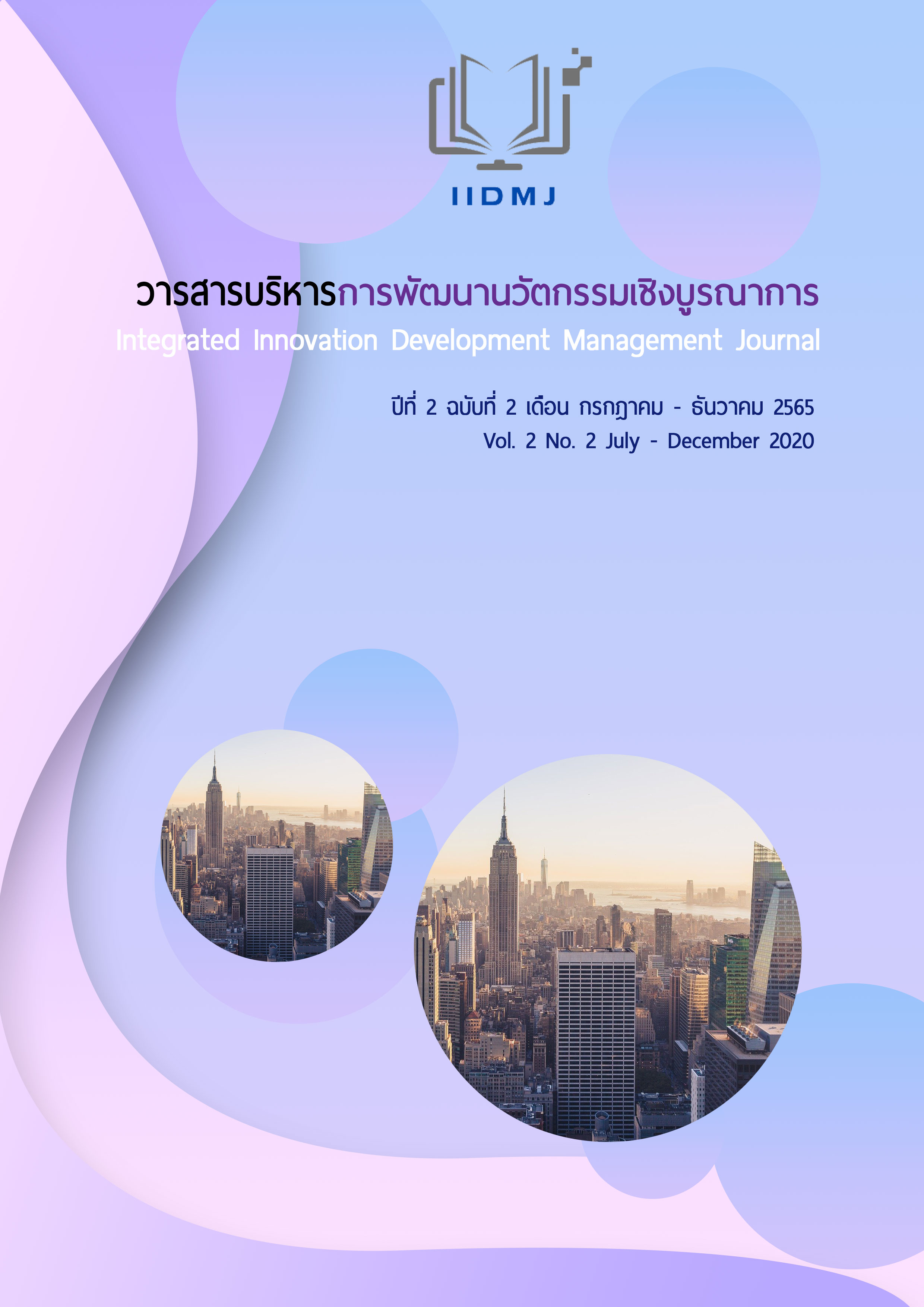ประเทศไทยกับการพัฒนาอย่างยั่งยืน
คำสำคัญ:
เศรษฐกิจพอเพียง, การพัฒนาอย่างยั่งยืน, ประเทศไทยบทคัดย่อ
บทความนี้เป็นการศึกษาเอกสารรวบรวมแนวคิด หลักการ และความก้าวหน้าในการขับเคลื่อนประเทศไทยไปสู่เป้าหมายการพัฒนาที่ยั่งยืนขององค์การสหประชาชาติ โดยพบว่า ความยั่งยืนของโลกใบนี้ขึ้นอยู่กับหลักการ 3 ประการ คือ 1) ความหลากหลายของสิ่งมีชีวิต (Biodiversity) 2) แหล่งพลังงาน (Solar Power) และ 3) วัฏจักรของธาตุอาหาร (Nutrient Cycling) ที่เป็นองค์ประกอบที่สำคัญต่อการนำมาเป็นพื้นฐานที่ต้องคำนึงถึงในการพัฒนาที่ยั่งยืนให้มีความเหมาะสมกับบริบทของประเทศไทย ทั้งนี้แนวคิดที่สำคัญในการขับเคลื่อนประเทศไทยสู่การพัฒนาที่ยั่งยืนที่สำคัญ 2 แนวทางคือ แนวคิดพุทธศาสนากับการพัฒนาที่ยั่งยืน และศาสตร์พระราชากับงานพัฒนาที่ยั่งยืน โดยหลักการที่สำคัญและเป็นที่ยอมรับในระดับนานาชาติ คือ หลักปรัชญาเศรษฐกิจพอเพียง ซึ่งเป็นปรัชญาที่มีประโยชน์ต่อประเทศไทยและนานาประเทศ และสามารถเริ่มได้จากการสร้างภูมิคุ้มกันในตนเอง สู่หมู่บ้าน และสู่เศรษฐกิจในวงกว้างขึ้นในที่สุด นอกจากนี้ความมุ่งมั่นของประเทศไทยในการขับเคลื่อนประเทศให้บรรลุเป้าหมายของ SDGs ทั้ง 17 เป้าหมายในปี 2573 นั้นประเทศไทยถูกจัดอันดับอยู่ในลำดับที่ 55 จาก 149 ประเทศ มีคะแนนรวมอยู่ที่ 62.20 คะแนน โดยเป้าหมายที่ประสบความสำเร็จมากที่สุดคือ เป้าหมายที่ 1 การยุติปัญหาความยากจน ในทางกลับกันเป้าหมายที่เป็นเรื่องจำเป็นเร่งด่วนที่ประเทศไทยต้องให้ความสำคัญและเร่งมือในการพัฒนามีทั้งหมด 6 เป้าหมาย คือ 1) การขจัดความหิวโหย 2) การมีสุขภาพและความเป็นอยู่ที่ดี 3) อุตสาหกรรมนวัตกรรมและโครงสร้างพื้นฐาน 4) การรับมือกับการเปลี่ยนแปลงสภาพภูมิอากาศ 5) การใช้ประโยชน์จากระบบนิเวศทางบก และ 6) สังคมสงบสุข ยุติธรรม และการไม่แบ่งแยก นับเป็นก้าวสำคัญและเป็นเรื่องที่ท้าทายของประเทศไทยในการขับเคลื่อนให้บรรลุเป้าบรรลุเป้าหมายของ SDGs ทั้ง 17 เป้าหมายในอนาคต
เอกสารอ้างอิง
Baxter, W., & Grossman, N. (2017). A Call to Action: Thailand and the Sustainable Development Goals (SDGs). BKK,THA: Editions Didier Millet.
Bertazzi, P., Gomme, J., & Whelan, N. (1997). SDG Compass. Retrieved from https://sdgcompass.org/wp-content/uploads/2015/12/019104_SDG_Compass_Guide_2015.pdf
Caiado, R. G. G., de Freitas Dias, R., Mattos, L. V., Quelhas, O. L. G., & Leal Filho, W. (2017). Towards sustainable development through the perspective of eco-efficiency - A systematic literature review. Journal of Cleaner Production, 165(Supplement C), 890-904. doi:https://doi.org/10.1016/j.jclepro.2017.07.166
Commoner, B. (1971). The Closing Circle. USA: Field Enterprises Education Corporation,.
G. Tyler Miller, & Scott Spoolman. (2015). Sustaining the Earth (11 ed.). USA: Cengage Learning.
Green Alliance. (2007). the nutrient cycle: closing the loop. UK: Green Alliance,.
I. Láng. (1995). Nutrient cycling and sustainability. Fertilizer research, 43(1-3), 31-35.
Kitikorn Charmondusit, Shabbir H. Gheewala, & Thumrongrut Mungcharoen. (2016). Green and sustainable innovation for cleaner production in the Asia-Pacific region. Journal of Cleaner Production, 134, 443-446. doi:dx.doi.org/10.1016/j.jclepro.2016.06.160
Ministry of Foreign Affairs of the Kingdom of Thailand. (2016). A Prctical Approach Toward Sustainable Development. BKK,THA: Ministry of Foreign Affairs of the Kingdom of Thailand,.
Sadhu, M., Chakraborty, S., Das, N., & Sadhu, P. K. (2015). Role of Solar Power in Sustainable Development of India TELKOMNIKA
Indonesian Journal of Electrical Engineering, 14(1), 34-41. doi:10.11591/telkomnika.v14i1.7668
Saeed D. Foroudastan, & Olivia Dees. (2006). Solar Power and Sustainability in Developing Countries Paper presented at the Proceedings of the International Conference on Renewable Energy for Developing Countries, Notre-Dame University Zouk Mosbeh, Lebanon.
Shahid Naeem, Robin Chazdon, J. Emmett Duffy, Case Prager, & Boris Worm. (2018). Biodiversity and human well-being: an essential link for sustainable development. Proceedings of the Royal Society B: Biological Sciences, 283(1844). doi:10.1098/rspb.2016.2091
Stockholm Resilience Centre. Applying Resilience Thinking SWEDEN: Stockholm Resilience Centre,.
Supachet Chansarn. (2013). Assessing the Sustainable Development of Thailand. Procedia Environmental Sciences, 17(3), 611 – 619. doi:10.1016/j.proenv.2013.02.077
Sustainable Development Solutions Network. (2016). SDG INDEX & DASHBOARDS. Retrieved from USA: http://www.sdgindex.org/assets/files/sdg_index_and_dashboards_compact.pdf
UMHELLOO. (2015). Biodiversity, Solar Power, and Nutrient Cycling- THE THREE PRINCIPLES OF SUSTAINABILITY. Retrieved January 7, 2017, from UMHELLOO https://umhelloo.wordpress.com/2015/03/10/biodiversity-solar-power-and-nutrient-cycling-the-three-principles-of-sustainability/
United Nations Thailand. (2015). From MDGs to SDGs. Retrieved Jan,07 2017, from United Nations Thailand, http://www.un.or.th/globalgoals/th/the-goals/
Zedan, H. (2002). Biodiversity and Sustainable Development. Retrieved from Canada: https://www.cbd.int/doc/newsletters/news-sd-suplement-en.pdf
ไทยพับลิก้า. (2560). บทสรุป SDGs ไทยปี 2560 : อีกไกลแค่ไหนจึงจะไปถึงเป้าหมาย. สืบค้นเมื่อวันที่ มกราคม 07, 2561, จากไทยพับลิก้า https://thaipublica.org/2017/12/sdg2017-review/
พระพรหมคุณาภรณ์ (ป.อ.ปยุตฺโต). (2556). การพัฒนาที่ยั่งยืน (13 ed.). กรุงเทพฯ: โกมลคีมทอง, สนพ. มูลนิธิ.
พิราวรรณ ชนะพาห์. (2551). กระบวนทัศน์การพัฒนาที่ยั่งยืนตามหลักปรัชญาเศรษฐศาสตร์แนวพุทธและเศรษฐกิจพอเพียง. (วิทยาศาสตรมหาบัณฑิต). สถาบันบัณฑิตพัฒนบริหารศาสตร์, กรุงเทพฯ: ผู้แต่ง.
มูลนิธิมั่นพัฒนา. (2560). ศาสตร์ของพระราชา. สืบค้นเมื่อวันที่ มกราคม 7, 2561, จากมูลนิธิมั่นพัฒนา http://www.tsdf.or.th/th/philosophy/
สถาบันไทยพัฒน์. (2560). Thailand - Corporate SDG Performance. สืบค้นเมื่อวันที่ มกราคม 08, 2561, จากสถาบันไทยพัฒน์ http://www.thaicsr.com/2017/03/thailand-corporate-sdg-performance-124.html
สำนักงานคณะกรรมการพัฒนาการเศรษฐกิจและสังคมแห่งชาติ. (2546). การพัฒนาที่ยั่งยืนในบริบทของประเทศไทย. กรุงเทพฯ: ผู้แต่ง.
สำนักงานคณะกรรมการพัฒนาการเศรษฐกิจและสังคมแห่งชาติ สำนักนายกรัฐมนตรี. (2560). แผนพัฒนาเศรษฐกิจและสังคมแห่งชาติ ฉบับที่สิบสอง พ.ศ.2560-2564. กรุงเทพฯ: ผู้แต่ง.
สำนักงานคณะกรรมการพิเศษเพื่อประสานงานโครงการอันเนื่องมาจากพระราชดำริ (สำนักงาน กปร.). (2560). โครงการอันเนื่องมาจากพระราชดำริ. สืบค้นเมื่อวันที่ มกราคม 7, 2561, จากสำนักงานคณะกรรมการพิเศษเพื่อประสานงานโครงการอันเนื่องมาจากพระราชดำริ (สำนักงาน กปร.).
สุทธิพร รัตนธร ศรัทธา. (2554). ศึกษาการพัฒนาที่ยั่งยืนแนวพุทธในทัศนะของพระธรรมปิฎก (ป.อ.ปยุตโต). (ปริญญาพุทธศาสตรมหาบัณฑิต). มหาวิทยาลัยมหาจุฬาลงกรณราชวิทยาลัย, กรุงเทพฯ: ผู้แต่ง.
ดาวน์โหลด
เผยแพร่แล้ว
รูปแบบการอ้างอิง
ฉบับ
ประเภทบทความ
สัญญาอนุญาต

อนุญาตภายใต้เงื่อนไข Creative Commons Attribution-NonCommercial-NoDerivatives 4.0 International License.



